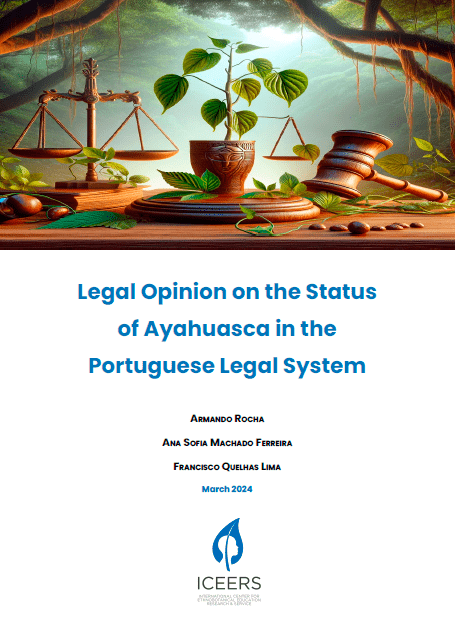ICEERS | 12 MARCH 2024
The legal framework surrounding ayahuasca in Portugal is complex and nuanced. It reflects a broader global conversation occurring on the intersection of traditional practices, religious freedom, and drug policy. The history of ayahuasca in the country has been influenced by globalization, migration, and evolving attitudes toward psychedelics and alternative forms of healing. A recently published, comprehensive legal opinion, authored by Ana Sofia Machado Ferreira, Francisco Quelhas Lima, and Armando Rocha thoroughly examines the legal framework surrounding ayahuasca in Portugal and discusses its implications for religious and ceremonial contexts.
Drug Policy in Portugal
Portugal embraced a transformative shift in drug policy in 2001 when the possession of drugs for personal consumption transitioned from a criminal offense to an administrative one. Law 30/2000 adopted a health-centered approach to decriminalization, aiming to strike a balance between safeguarding the well-being of substance users and addressing public health concerns. Individuals found in possession of small amounts of any drug may be mandated to undergo evaluation by local drug addiction commissions to determine appropriate interventions.
This shift resulted in a policy of tolerance toward drug consumption while maintaining strict regulations on drug trafficking and possession exceeding small amounts. These regulations are also open to legal interpretation, considering factors such as the individual’s intent, the quantity of the substances involved, and personal history.
Ayahuasca’s Status: Legal Confusion
While Portugal has a progressive drug policy, the legal status of ayahuasca remains ambiguous and has been a subject of debate and uncertainty. This stems from the complex legal classification of the ayahuasca brew, which contains DMT, a controlled substance in many countries- including Portugal.
Regarding international law, the status of ayahuasca is not explicitly defined under the Convention on Psychotropic Substances (1971), leaving it up to national governments to determine control measures. Ayahuasca is not explicitly prohibited in Portugal. But DMT is considered illegal under Decree Law 15/93, with penalties ranging from fines to imprisonment for violations. The presence of DMT in the ayahuasca brew remains regulated under Portuguese drug laws, with potential legal repercussions for possession, importation, or distribution.
However, the consumption of substances listed in Portugal’s Decree-Law no. 15/93 is not considered criminal if the quantity falls below what is required for an individual’s average consumption over a 10-day period. While DMT is mentioned in the law, the analysis in the Legal Opinion on the Status of Ayahuasca in the Portuguese Legal System suggests that the brew and its ingredients are not explicitly regulated. This interpretation is in line with international treaties governing psychotropic substances, none of which include ayahuasca.
The Question of Religious Freedom
Ayahuasca within a religious context is safeguarded by freedom of religion provisions in Portugal, which prohibit broad restrictions that would infringe upon constitutional and international human rights standards. However, the legal status of ayahuasca within the framework of religious freedom law is subject to interpretation. Law 16 of 2001 delineates the conditions for recognizing religious communities, yet the classification of ayahuasca as a sacrament is a legal gray area. Portuguese authorities have been inconsistent in their approach, frequently categorizing ayahuasca as prohibited solely based on the presence of DMT. This stance lacks legal basis and leaves room for challenge.
Brazilian immigration introduced established ayahuasca religions such as Santo Daime and União do Vegetal (UDV) to Portugal. While both are recognized as religions in Brazil, both UDV and Santo Daime have faced challenges in getting recognition as formal religious institutions in Portugal. The interpretations of freedom of religion and criminal law in the country vary. Despite their religious significance, achieving legal recognition is an ongoing challenge, with the need for strategic approaches to navigate regulatory issues.
Obstacles and Opportunities
Ayahuasca’s current legal ambiguity in Portugal poses challenges for both practitioners and policymakers. Inconsistent enforcement and misinterpretation of laws create uncertainty and impede the advancement of safe, regulated practices. Legal clarity and recognition of religious practices are essential to ensure the rights of individuals and communities. Navigating these complexities presents opportunities for dialogue, education, and mutual participation. Collaboration among policymakers, religious groups, and legal experts is essential to establish a framework that respects cultural heritage and individual freedoms.
Education and awareness can address legal uncertainties. By providing accurate information about ayahuasca’s cultural significance, therapeutic potential, and safety profile, policymakers can promote informed decision-making and clear up misconceptions. Public dialogues, workshops, and conferences can serve as platforms for constructive discussions to encourage a deeper understanding of ayahuasca’s significance in contemporary society.
Policy reform efforts must also reassess existing laws and regulations to ensure they align with an understanding of ayahuasca and other ancestral medicines. Collaborative endeavors between government agencies, legal experts, and ayahuasca communities can pave the way for progressive policies that align public health with the preservation of religious and cultural rights.
Final Considerations
Portugal presents an intriguing case study on the globalization of ayahuasca and the complex interface between ancestral medicines and drug control laws. Clarity is paramount when navigating the legal landscape of ayahuasca in any country. While existing laws in Portugal offer some protections for religious and ceremonial purposes, inconsistencies and challenges persist. The country can establish a legal framework that respects tradition, upholds individual rights, and embraces the transformative potential of ayahuasca within society. As the legal and cultural landscape evolves, it is imperative that legislation supports cultural diversity, honors Indigenous wisdom, and is dedicated to justice and inclusivity.
For a comprehensive understanding of the legal status of ayahuasca in Portugal, refer to the complete report below.
* References available in the full report.
Download the full report
Status of Ayahuasca in the Portuguese Legal System
This report examines the legal landscape of ayahuasca in Portugal, exploring the interplay between national laws and the complexity of the ayahuasca brew. The full report provides detailed insights into Portugal’s drug policies, ayahuasca, and how this impacts religious freedom and justice.
Categories:
Reports
, NEWS
Tags:
legality
, ayahuasca
, Portugal


